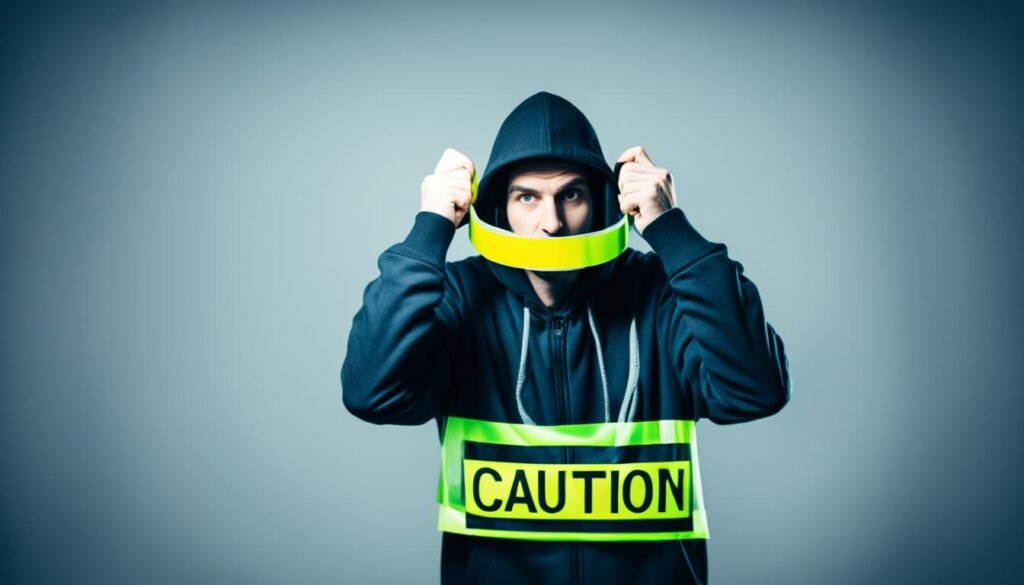Have you ever thought about if your home security system is legal? Many modern security cameras now come with microphones and can talk back. This makes it important to know about
It’s key to make sure your audio monitoring is safe and follows the law. This is true for both your home and business. The rules on listening in vary a lot from state to state. For example, California says everyone must agree before you can record, but other places only need one person’s okay.
With over half of burglaries happening at homes, audio alerts can really help keep you safe. Good brands offer top-notch sound recording that can pick up on things like breaking glass. But remember, to listen legally, you must follow the laws. The rules can be complex, but talking to lawyers through sites like UpCounsel can help you stay on the right side of the law.
Understanding Federal Audio Surveillance Laws
Federal laws on audio surveillance aim to balance privacy with law enforcement and national security needs. Title III, found at 18 U.S.C. § 2510, sets rules for electronic surveillance and wiretaps. Passed in 1968 and updated in 1986, it limits private citizens from using certain surveillance methods without permission.
One-Party Consent Rule
The one-party consent rule says at least one person in a conversation must agree to be recorded. If someone is part of a conversation, they can record it legally without telling others. But, remember, state laws on this can differ, and following your state’s rules is key to avoid trouble.
Federal Wiretapping Regulations
Federal wiretapping regulations require law enforcement to follow strict rules for electronic surveillance. They need high-level approval from the Department of Justice for wiretaps in federal crime investigations. Also, they must get court orders from judges to carry out these surveillance activities.
Using hidden audio devices or surveillance without permission can lead to big problems. For instance, “hidden nanny cams” with microphones might break wiretapping laws. This could result in legal issues like lawsuits, fines, or even jail time.
New policies also make sure surveillance requests include a signed cover sheet and a probable cause affidavit from a police officer.
State Laws on Audio Surveillance
It’s important to know about state audio surveillance laws if you want to record conversations. These laws vary by state, with some needing one-party consent and others needing all-party consent. These rules affect how you can use eavesdropping devices in each place.
One-Party Consent States
In the U.S., 35 states follow one-party consent for audio recordings, which is also the federal rule. This means you can record a conversation if you’re part of it. States like New York and Texas let you record without the other person’s okay.
But, it’s smart to check the specific laws in each state to avoid legal trouble.
All-Party Consent States
On the other hand, 11 states need all-party consent for recordings. This means everyone in the conversation must agree to be recorded. States like California and Pennsylvania are strict about this rule to stop illegal recordings.
Breaking this rule can lead to big legal problems. So, it’s key to know and follow these laws when using eavesdropping devices in these places.
Importance of Consent in Audio Surveillance
Consent is key in audio surveillance. It makes sure privacy rights are kept safe and sets a legal base for recordings. Without consent, any recording might not be allowed in court, leading to legal problems.
In Colorado, the law says you need consent for audio surveillance, unless it’s for security or business with public notice. This rule balances surveillance needs with privacy rights.
When thinking about using audio recordings in court, knowing state laws is vital. Home sellers must tell people about recordings, or they could face legal trouble. Clear signs or MLS comments about recordings keep things honest and avoid legal problems.
Experts like brokers and lawyers should talk about surveillance rules. This keeps everyone informed about the laws and what it means to legally record conversations. Also, signs that tell visitors they might be recorded are key. They respect privacy and follow the law.
Women often find audio recordings crucial in court for proving domestic abuse or violence. But, it’s key to get this evidence the right way, following state consent laws, to make sure it counts in court.
There are many ways to save voicemails and other audio, from old tape recorders to apps. Courts have rules for accepting this evidence, like needing the right equipment and transcripts. This shows why getting the right consent in audio surveillance is so important for legal evidence.
In short, knowing and respecting consent is crucial for legally recording conversations for surveillance. It follows the law and protects everyone’s privacy.
Can Employers Record Audio in Their Workplace?

Employers often use audio surveillance to keep the workplace safe and productive. But, recording audio at work brings up legal and ethical issues. It’s key to be open and follow the law when monitoring.
Employee Handbooks and Notice
Employers need to clearly tell employees about audio surveillance. This can be done by adding details in employee handbooks. Also, putting up signs in public areas helps remind people about the audio recording.
Notice is very important because it meets legal requirements. Most states, including 38 and the District of Columbia, follow a one-party consent rule. This makes it easier to set up surveillance. But, in 12 states, you need consent from everyone affected.
Legal Implications for Employers
Employers face many legal challenges with audio surveillance. Knowing state and federal laws is crucial. For example, in Florida, recording conversations without consent can lead to serious charges.
The Cohen Bros., LLC v. ME Corp. case showed that business talks may not be private. Employers should document why they’re monitoring audio and where. This can reduce legal risks.
Following the law with audio monitoring is key. It builds trust and respect among employees. This way, audio surveillance is seen as a way to improve safety, not invade privacy.
Is It Legal to Record Audio at Home?
Home audio recording laws change from state to state. It’s key to know the laws in your area. The federal Wiretap Act says you can record if one person agrees. But, things get tricky with surveillance in private residences.
One-Party Consent in Private Residences
In most U.S. states, the one-party consent rule applies. This means you can record audio at home if you’re part of the conversation. This rule is based on the idea that people in a conversation don’t expect privacy from each other.
But, it’s smart to think about recording in places like bathrooms and bedrooms. These areas are seen as more private.
Legal Gray Areas
There are gray areas when home audio recording laws meet privacy expectations. Recording secretly in places where people expect privacy can lead to legal trouble. Bedrooms and bathrooms are seen as very private in many places.
So, be careful when recording in these areas to follow the law and respect privacy.
Before starting to record audio at home, check the laws in your area. This helps you follow the rules and protect your privacy.
Guidelines for Audio Surveillance in Public Areas
Audio surveillance in public places needs careful handling to follow federal and state laws. These rules help guide us through the complex issues.
When is Audio Surveillance Allowed?
In public, people expect less privacy, so audio surveillance is okay under certain conditions. Places like parks, streets, and malls usually let you record sounds, but not in private areas where it’s banned by law. Silent video recording is also okay, thanks to court decisions.
Recording sounds is usually fine if one person agrees to it, like in Texas and Colorado. But, in California and Florida, everyone must agree before recording. This makes things clear.
Posting Warning Signs
Using audio recording signs is key when setting up audio surveillance in public. These signs tell people that they’re being recorded. If someone stays in a place with these signs, they’re seen as agreeing to the surveillance.
This method follows both federal and local laws, avoiding legal issues. In places like Washington, DC, owners must put up signs to be clear and legal.
Legal Issues Surrounding Hidden Audio Devices
In the United States, hidden audio devices for covert surveillance face strict laws. Eavesdropping laws aim to protect privacy, making it illegal to record without consent. Maryland is one of 12 states that require all parties to agree before recording audio.
In Maryland, recording a private conversation without everyone’s okay is a felony. This crime can lead to up to five years in jail, a fine of up to $10,000, or both. These strict rules highlight the need to follow consent laws with hidden audio devices.
While Maryland allows video surveillance on personal property, there are exceptions. Places like bathrooms and dressing rooms are off-limits for privacy reasons. It’s important to follow these laws to avoid legal trouble. Knowing the fine line between surveillance and privacy laws is key to respecting everyone’s rights.
Federal vs. State Audio Surveillance Regulations
Understanding the rules on audio surveillance requires knowing the differences between federal and state laws. Federal law sets the basic rules, but state laws add more details. These laws make following the rules of audio surveillance complex, especially with listening devices.
At the federal level, you can record private talks if one person agrees. But in states like California, Delaware, Florida, Illinois, and Maryland, you need everyone’s okay. In these places, recording without everyone’s consent is illegal and can lead to big fines or even criminal charges.
In Georgia, you can use surveillance cameras in public and private areas if they’re visible. But, you still need consent to record conversations. States like New Hampshire and Maine say you need consent if people feel they have a right to privacy. This shows why it’s key to know the strictest laws for legal audio surveillance.
It’s crucial to talk to legal experts to understand these rules. Making sure you follow the laws means knowing the fine details that can affect your legal standing. So, keeping up with both federal and state laws is vital for anyone using audio surveillance.


